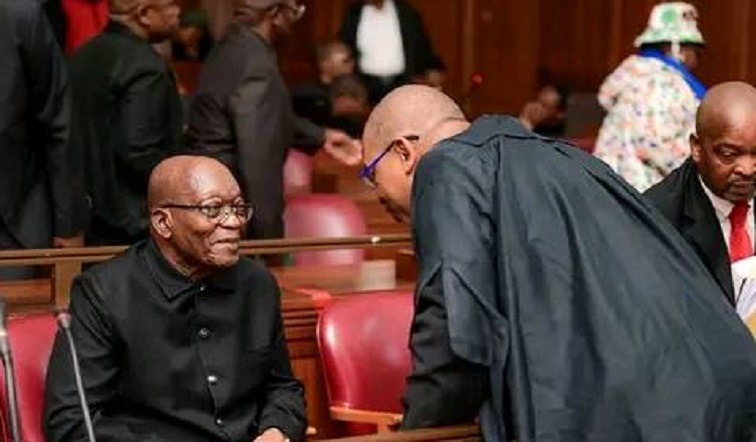The remission of sentence granted to former President, Jacob Zuma reduced his sentence. This is the argument advanced by his legal counsel, Advocate Dali Mpofu (SC).
Mpofu argues that the ultimate sentence meted out against Zuma is effectively three-months due to the remission of sentence instead of the 15-months imposed by the Constitutional Court against him in 2021.
Mpofu argues that because of this, the 12 months that Zuma ought to have completed, was cancelled.
The Constitutional Court is hearing the IEC’s appeal seeking clarity and the correct interpretation of Section 47 subsection (1)(e) of the Constitution after the Electoral Court ordered Zuma to remain on the MK party’s candidates list.
Mpofu gave this argument before the bench.
“But you can’t wish away the remission. They say that the effect of remission is the reduction of the sentence. The definition in the Oxford Dictionary … in the Oxford Law Dictionary says that remission is the cancellation of a part of a sentence. It’s that simple. The definition that you also find in the Oxford Thesaurus says the following, among other things, that remission amounts to setting aside, lessening, reducing the sentence,” argues Mpofu.
The MK Party and former President Jacob Zuma have argued that the Independent Electoral Commission (IEC) had no authority to invoke the section of the constitution that disqualifies any person who has been convicted of an offence and sentenced to more than 12-months imprisonment without the option of a fine.
Mpofu has argued that the commission’s invocation of the section amounts to a violation of the separation of powers principle because it is only the National Assembly that has the powers to regulate its membership.
The Constitutional Court is hearing the IEC’s appeal of the Electoral Court order that allowed Zuma to remain on the MK Party candidates list.
Mpofu argues that the electoral body acted beyond its legal powers.
“Does the IEC get the power to implement Section 47 for disqualifying someone in the National Assembly. The answer is nowhere. The power to stand in an election is in the full province of the IEC. It’s clear from Section 31(a), but the power to qualify and disqualify someone, if elected to stand office, has got absolutely nothing to do with the IEC,” argues Mpofu.
Advocate Tembeka Ngcukaitobi, acting on behalf of the IEC, has argued that the ability of the Executive to reduce sentences imposed by courts would weaken the judiciary.
The Electoral Court justices disagreed on the approach in dismissing the objection in terms of Section 47 Subsection (1)(e) in relation to former president Zuma contesting the upcoming elections.
The judgment penned by Justice Modiba in the Electoral Court agreed with the submission made by the MK Party and Zuma that the remission of sentence reduced the 15-month sentence meted out against him to three months.
However, the IEC says this is not the correct way of looking at the matter as it is looking at the matter retrospectively instead of prospectively.
Ngcukaitobi says this can only encourage the disrespect for the law.
“The argument about remissions as reducing judicially imposed sentences simply weakens the judiciary. It enables the administration to treat judicial sentences as pro non scripto – an outcome that can only encourage disrespect for the law. That would also threaten some key provisions of the constitution. In sum, we argue that the Electoral Court fundamentally erred when it held that the impact of a remission is a reduction of the sentence. That is not borne out of the text ; it is not borne out of the history, and it is not borne out by the purpose of the section,” argues Ngcukaitobi.
2024 Elections | IEC in ConCourt to appeal Zuma’s elections eligibility:

